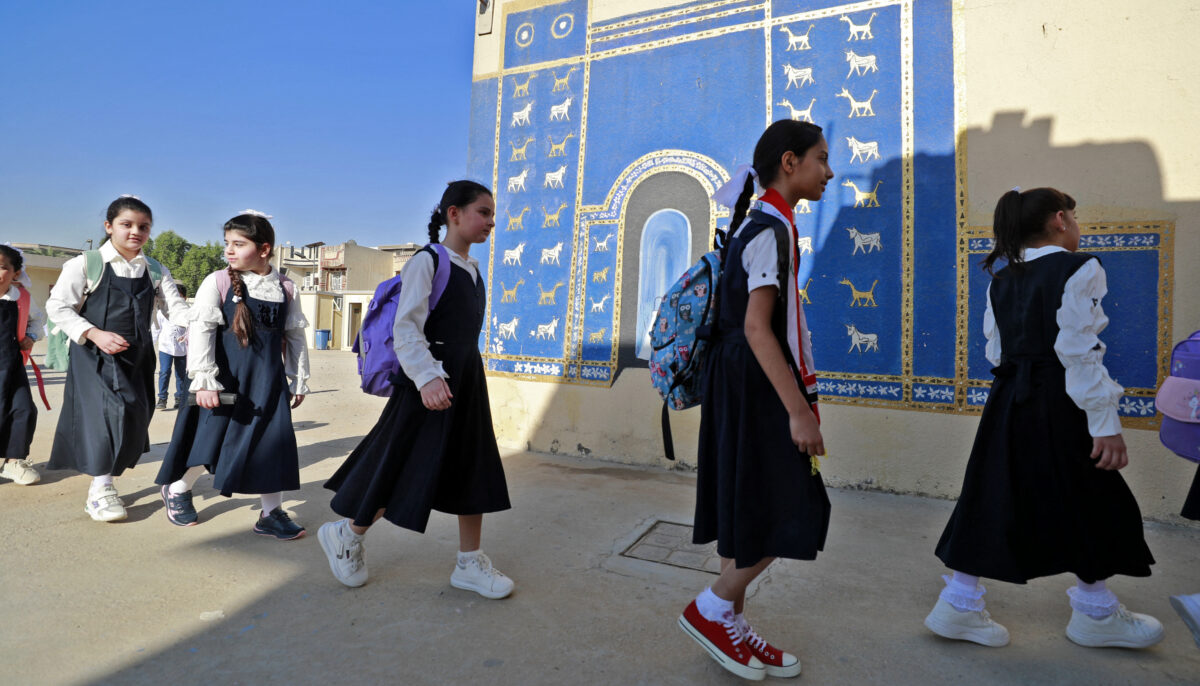Update: The Iraqi Ministry of Communications announced on May 19 that internet shutdowns will take place in conjunction with the start of the final exams for middle school on May 21. According to the ministry’s statement, the internet will be down from 6:00 AM to 8:00 AM throughout the exams period, based on higher directives and at the request of the Ministry of Education.
For the first time since 2015, primary ministerial exams began in Iraq on May 12 without the usual internet shutdowns. It is unclear whether the Iraqi Ministry of Education will resume shutdowns this year, according to spokesperson Kareem Alsayed.
“We are focusing our efforts on combating exam leaks, and this is the first time exams take place under good security conditions,” Alsayed told SMEX. “The country’s frail security situation had prompted us to shut down the internet in the past.”
Member of the Education Committee in Iraq Najwa Kakayi stated that “The committee has not reached a decision regarding the shutdown of internet services during exams yet,” claiming that this measure is “typically implemented annually by the Ministry as a precautionary step to ensure the smooth conduct of exams, minimize confusion among students, and safeguard the confidentiality of exam questions.”
“It’s possible that Grade 6 primary-level exams will proceed without internet shutdowns, while discussions continue regarding exams at the intermediate and preparatory levels.”
Last year, the Minister of Communications initially announced that it will suspend the practice of shutting down the internet during exams for the first time since 2015. However, this decision was later reversed, leading to multiple internet shutdowns in June, July, August, and September 2023.
Anticipating a potential decision to block internet access between May and June, and as part of the #NoExamShutdown campaign, SMEX, Access Now, the Internet Society, along with several civil society organizations and members of the #KeepltOn coalition—a global network comprising over 300 organizations from 105 countries working to end internet shutdowns—appealed to the relevant authorities in Iraq to commit to protecting internet access during the upcoming national exams.
Internet Shutdowns in Iraq: A Practice Since 2014
The Iraqi government first cut off the internet in June 2014, citing “the exceptional security situation that Iraq is experiencing due to ISIS’s control over some governorates.”
Since 2015, Iraqi authorities have consistently enforced internet shutdowns, allegedly to prevent exam questions from getting leaked and to combat cheating during exams. But Iraq has disrupted internet connection for other reasons. During the popular protests in 2019, authorities not only blocked access to most social media platforms but also completely cut off internet access to obstruct demonstrators and disrupt their movements.
In this context, Iraqi lawyer Dhuha Refaat Allami explained to SMEX that cutting off the internet during exams blatantly infringes upon Iraqis’ rights and freedoms as enshrined in the Iraqi Constitution of 2005.
Allami emphasized that public and personal freedoms, including communication, are protected by the constitution and may only be restricted or monitored through judicial decisions, except in cases of security or legal necessity.
Article 40 of the Iraqi Constitution guarantees “freedom of communications and correspondence, postal, telegraphic, electronic, and telephonic,” while Article 46 specifies that any restrictions on these rights and liberties must be enacted through law and must not violate the essence of the right or freedom in question.
The Internet is Essential for Students
By enforcing shutdowns, Iraqi authorities overlook or disregard the internet’s vital role in students’ education, as highlighted by Muslim Al-Sharaa, who is gearing up for his secondary exams. In a conversation with SMEX, Al-Sharaa expressed his disillusionment with the decision to cut off the internet.
“Internet shutdowns have tarnished my perception of the government. It fails to uphold its professionalism, especially the Ministry of Education, which is entrusted with shaping future generations. We are aware of the presence of corruption within educational institutions, a scourge that persists regardless of internet availability.”
Al-Sharaa further emphasized the indispensable nature of the internet for students, highlighting how its interruption hampers their ability to review their exam answers. He notes that students have shifted away from traditional educational materials, now heavily relying on online information and resources.
Moreover, al-Sharaa shared his personal experience of abandoning an online business project initiated last year due to plummeting sales caused by recurring internet shutdowns. He underscored how this measure not only impacted his own ventures but also affected the interests of his friends engaged in digital commerce, leading to significant financial losses beyond their capacity to bear.
“The policy of internet shutdowns, which curtails internet freedom and stifles freedom of expression for over 40 million people, casts Iraq in a negative light internationally. This occurs alongside a lack of unity among different segments of Iraqi society in challenging government decisions that increasingly evade scrutiny.”
Internet shutdowns restrict communication, self-expression, and access to essential information—particularly during emergencies and crises—violating people’s fundamental human rights as outlined in the Universal Declaration of Human Rights and the International Covenant on Civil and Political Rights.
The international community widely condemns such disproportionate and costly measures, as articulated in the United Nations Human Rights Council Resolution (OHCHR) 47/16, which denounces “the use of internet shutdown measures to intentionally and arbitrarily prevent or disrupt access to information or its dissemination.”
Impact on Digital Workers
Internet disruptions have substantial economic repercussions, disproportionately affecting workers whose livelihoods depend on connectivity. Journalists, human rights activists, delivery service personnel, internet service providers, telecommunications professionals, money transfer agents, and many others suffer when the internet is down.
Prominent Iraqi journalist Assaad Al-Zalzali told SMEX that last year’s internet shutdowns “forced him to travel to Erbil to ensure uninterrupted connectivity and continue his collaboration with international entities.”
According to Al-Zalzali, blackouts felt like being in “a state of paralysis.”
The Iraqi journalist stressed that the essence of journalistic work revolves around timely dissemination of information to mobilize public opinion. During internet shutdowns, however, many news stories lose their relevance while authorities exploit the situation to crack down on activists.
Specialized reports on virtual network activity revealed that Iraq’s economy was hit the hardest globally because of internet shutdowns during the 2023 exam season. Measuring losses in Iraq, Iran and Algeria, the total shutdowns cost these economies over one billion dollars within a single year.
This impact is particularly significant for Iraq, recognized as one of the leading Arab nations in digital governance, with many transactions relying on electronic payment methods. Dr. Ammar Daoud Al-Ithawi, a communications specialist at Al-Nahrain University in Iraq, told SMEX that: “Suspension of payment services during official working hours in Iraq would lead to substantial financial losses for the government and adversely affect the private sector.”
Dr. Al-Ithawi and journalist Assaad Al-Zalzali concur that the primary reason for internet shutdowns lies in “rampant administrative corruption within the Ministry of Education.” They both advocate for addressing this issue through alternative means rather than resorting to electronic repression.
In June 2022, the United Nations High Commissioner for Human Rights issued a stark warning on the “dramatic” consequences of internet blocking, emphasizing its detrimental impact on people’s safety and human rights.
The report urged countries that resort to internet shutdowns—like Iraq—to refrain from taking such ineffective measures. It highlighted that previous instances of internet shutdowns have been accompanied by governments implementing security operations and imposing strict restrictions on human rights monitoring and reporting.
Regarding the Iraqi Ministry of Communications, which bears technical responsibility for internet shutdowns, Al-Ithawi points out that it maintains contracts with external companies to provide internet services. This arrangement compels the Ministry to pay significant compensation for the economic damage resulting from the deterioration of internet services, totaling up to USD 4 million.
The Iraqi Council of Ministers’ approval of the Ministry of Education’s request to cut off the internet constitutes an unjust and arbitrary measure against Iraqi citizens, according to Allami. She said that citizens pay for internet services in advance only to be deprived of them, resulting in significant harm. Allami emphasized the adverse repercussions stemming from the internet disconnection and the subsequent network weakness even after it is restored.
Al-Ithawi added that internet shutdowns have a significant economic impact. At a technical level, he explained the concept of a “cache server,” which comprises a network of servers distributed globally to facilitate the rapid delivery and distribution of internet content.
These servers enhance website access speed and provide users with a better browsing experience. However, an internet outage in the morning disrupts service for the remainder of the day, as the servers equipped with technology to improve internet quality require approximately 11 hours to resume normal operation after an internet cutoff.
The economic ramifications of a single day’s internet shutdown are staggering, estimated to cost the Iraqi economy around USD 1.4 million in losses and approximately USD 120,000 in foreign direct investment. These losses undermine the confidence of international companies in Iraq’s communication infrastructure and deter them from investing in the country.
Alternative Means
During periods of internet outage, Iraqis often turn to alternative methods to communicate with each other and the outside world. Al-Ithawi notes that modern mobile phones offer global roaming as an option, which many Iraqis utilize to activate electronic SIM cards (E-SIM). These E-SIMs enable roaming services to access the internet, and citizens extensively rely on them during blackout periods.
Allami highlights that companies affected by internet shutdowns have the option to seek legal recourse through the judiciary. They can file lawsuits against the Ministry of Education and the Ministry of Communications to obtain court rulings prohibiting the shutdowns of internet services. This legal avenue was pursued by Iraqi lawyer Mohammed Joumaa in 2019 when he filed a lawsuit against the Iraqi Minister of Communications due to internet shutdowns during the protests that occurred in November of the same year.
It’s worth noting that there is limited or even nonexistent evidence proving the effectiveness of internet shutdown measures in preventing cheating during exams. Most countries around the world conduct their national exams without resorting to this arbitrary measure. Despite internet-blocking measures, Iraq has experienced several instances of leaked national examination questions in recent years, indicating the ineffectiveness of such measures in maintaining the integrity of the examination process. This underscores the necessity of exploring alternative solutions.
Each year, the decision to cut off internet service sparks division within Iraq. Workers in the trade, business, and entertainment sectors express strong dissatisfaction due to the harm inflicted on their interests. Conversely, some parents and educators support the decision, viewing it as a solution to prevent cheating during exams.



